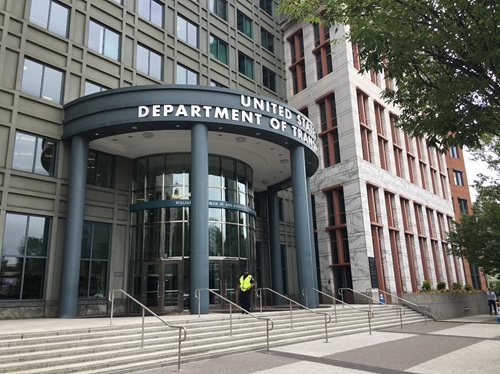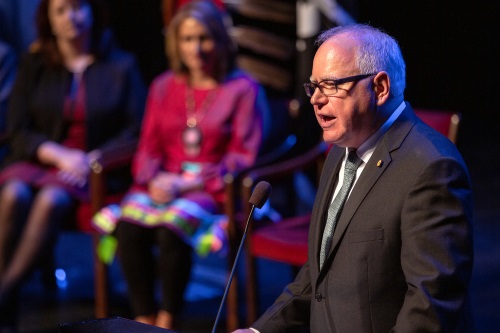Gov. Tim Walz (D) is proposing to phase in a 20-cent increase in Minnesota’s fuel tax over the next two years and index that tax to inflation as part of his overall state budget proposal unveiled on Feb. 19.
[Above photo via the Minnesota Governor’s Office.]
“Minnesota’s transportation system is aging and struggling to keep up with the demands of our growing population,” he noted in the fact sheet accompanying the release of his proposed budget.
“The Minnesota Department of Transportation projects that in order to simply operate and maintain our current roads and bridges, the state will need $18 billion over the next 20 years above current revenues,” the governor pointed out.

To accumulate those funds, Gov. Walz plans to:
- Initiate a 20-cent fuel tax increase, phased-in over two years, and index that tax to inflation beginning in fiscal year 2023. Combined together, those tax changes are expected to raise approximately $6.5 billion over 10 years.
- Increase the vehicle registration tax from 1.25 percent to 1.5 percent, while boosting the base tax fee from $10 to $45 and changing the depreciation schedule. That is projected to raise approximately $4 billion over ten years.
- Increase the motor vehicle sales tax from 6.5 percent to 6.875 percent. That would raise approximately $505 million over 10 years, with $300 million going towards roads and bridges and $205 million for “transit purposes.”
- Authorizing $2 billion in trunk highway bonds over eight years starting in 2022.
- Establish a 1/8-cent sales tax in the seven-county metropolitan area to maintain and expand the regional bus and transitway system, generating approximately $770 million.
- Authorize $20 million in general obligation transit bonds, with a goal of totaling $230 million in bonding over the next 10 years.
The governor also proposed to add 10 new bus rapid transit lines over the next decade as part of his budget plan; an expansion that would result in a 40 percent increase in service on the region’s busiest routes and an estimated 30 to 40 percent increase in regional transit ridership.

Furthermore, Gov. Walz’s budget also seeks to add 220 electric buses to the Minneapolis Metro Transit fleet as part of the agency’s goal to power all of its operations with renewable energy by the year 2040.
“With the transportation funding gap eliminated, Minnesotans will be better able to move to and from work, connect with other parts of the state and beyond, and depend on a smooth and reliable movement of goods and services,” the governor said.
 Top Stories
Top Stories
USDOT Issues $1B in Local Road Safety Funding
January 2, 2026 Top Stories
Top Stories

